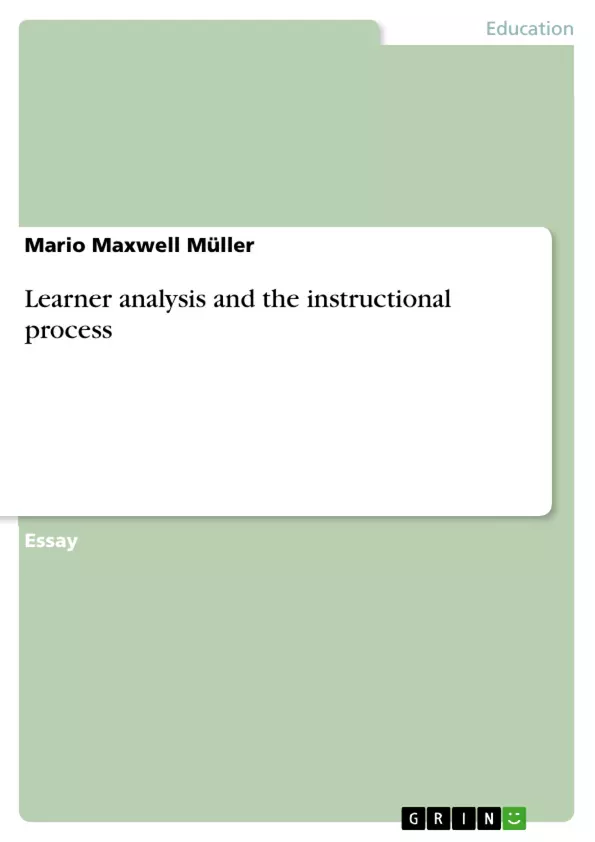This essay will elaborate on the learner analysis and the instructional process associated that can be used within an international school setting where students are studying the international baccalaureate programme in the secondary school. Promoting international mindedness, allows students to make greater connections within a global context, understand how the world works and how inquiry-based learning can be an effective tool used within the Middle Years or Diploma Programme.
Promoting opportunities for students to engage in a range of activities is important and necessary within secondary school, where students ask questions, inquiry, and are critical thinkers.
Table of Contents
- Introduction
- First Goal - Intended Target Audience
- Second Goal - What are the differences among learners in the group
- Third Goal - What is the motivation for students participating in instructional activities
Objectives and Key Themes
The primary objective of this essay is to explore the significance of learner analysis in crafting effective instructional processes within an international school setting. Specifically, the essay examines the application of learner analysis principles in the context of the International Baccalaureate (IB) program, emphasizing its relevance in cultivating international mindedness and promoting inquiry-based learning.
- Learner Analysis and Differentiation
- The Role of Technology in 21st-Century Learning
- Promoting Student Motivation and Engagement
- The Importance of Building Positive Learning Environments
- The IB Programme and International Mindedness
Chapter Summaries
- Introduction: This section underscores the significance of conducting thorough student analysis to cater to individual educational needs in an international school context. The focus lies on understanding students' goals, objectives, and learning preferences to facilitate effective instruction.
- First Goal - Intended Target Audience: This section emphasizes the importance of defining the intended target audience for instruction, considering factors such as age appropriateness, content suitability, and learning objectives. It highlights the role of differentiation and cooperative learning strategies in tailoring instruction to meet individual needs.
- Second Goal - What are the differences among learners in the group: This section delves into the significance of recognizing and addressing the diverse learning needs and abilities of students within a group. It emphasizes the need for individualized support, considering factors such as cultural background, language abilities, and special educational needs.
- Third Goal - What is the motivation for students participating in instructional activities: This section explores the critical role of motivation in student engagement and participation. It highlights the importance of educators fostering intrinsic motivation, considering individual learning styles, and employing a variety of strategies to encourage active participation and promote a positive learning environment.
Keywords
This essay explores key concepts such as learner analysis, differentiation, international mindedness, inquiry-based learning, the International Baccalaureate (IB) program, the Middle Years Programme (MYP), the Diploma Programme (DP), 21st-century skills, technology integration, student motivation, and creating positive learning environments.
Frequently Asked Questions
What is the primary objective of this essay on learner analysis?
The primary objective is to explore the significance of learner analysis in crafting effective instructional processes within an international school setting, specifically focusing on the International Baccalaureate (IB) program.
How does the essay relate learner analysis to international mindedness?
It emphasizes that learner analysis helps in promoting international mindedness by allowing students to make greater connections within a global context and understand how inquiry-based learning works.
What are the key goals discussed regarding the target audience?
The goals include defining the intended audience based on age appropriateness and content suitability, and recognizing differences among learners such as cultural background and language abilities.
What role does technology play in this instructional process?
Technology integration is identified as a key theme for 21st-century learning to support student engagement and effective instruction.
How is student motivation addressed in the text?
The text explores how educators can foster intrinsic motivation by considering individual learning styles and employing strategies that encourage active participation in a positive environment.
Which IB programs are specifically mentioned?
The essay specifically mentions the Middle Years Programme (MYP) and the Diploma Programme (DP).
- Citation du texte
- Dr. Mario Maxwell Müller (Auteur), 2022, Learner analysis and the instructional process, Munich, GRIN Verlag, https://www.grin.com/document/1292418



